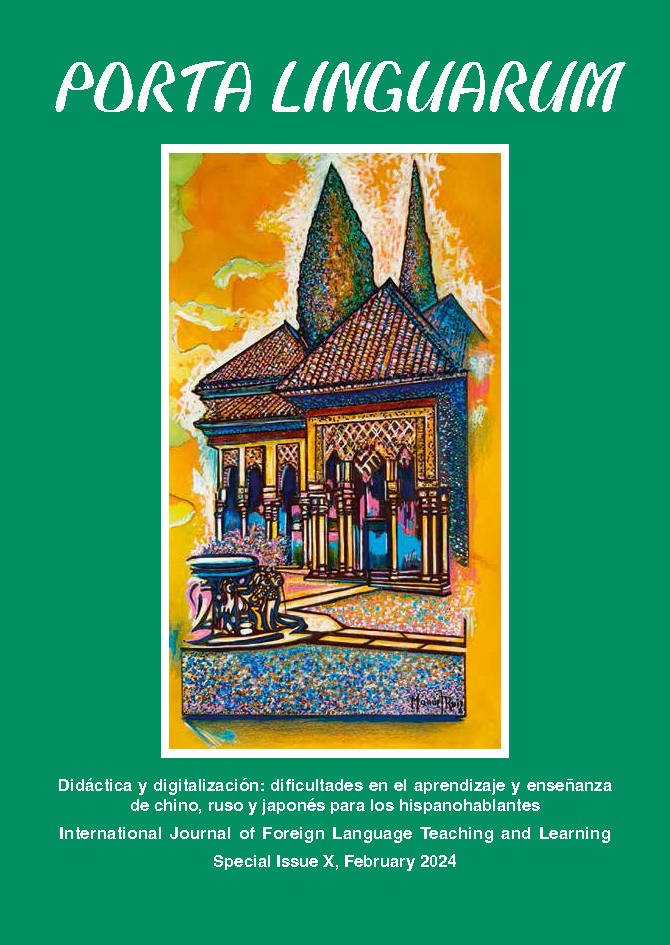Los enfoques por tareas y con tareas en los verbos de movimiento del ruso
DOI:
https://doi.org/10.30827/portalin.viX.27844Palabras clave:
enfoque por tareas, enfoque con tareas, ruso como lengua extranjera, verbos de movimiento, sistemas de gestión de aprendizajeResumen
El objetivo del presente estudio es determinar en qué medida los enfoques de enseñanza de lenguas con tareas (TS) y por tareas (TB) son efectivos en el aprendizaje de los verbos de movimiento del ruso. Con este fin se realizó un estudio experimental en condiciones de clase reales como parte de los cursos de lengua rusa de la Universidad de ****. Los participantes se dividieron en dos grupos, uno de los cuales recibió instrucción por tareas y el otro con tareas y se diseñó un estudio según el esquema de preprueba, postprueba y postprueba diferida. Las estrategias didácticas se implementaron mediante un sistema de gestión del aprendizaje (LMS), en este caso, Moodle. En el estudio se analiza la idoneidad y necesidad de los LMS en la enseñanza de lenguas actual. Los resultados muestran una mejora significativa tanto en el volumen como en la corrección de los verbos producidos. Esta mejora se da en la producción oral y escrita y en las pruebas de gramática (rellenar espacios en blanco, opción múltiple y juicio de gramaticalidad). Sin embargo, el grupo TB obtuvo resultados significativamente mejores que el grupo TS en la tarea oral y en la mayoría de postpruebas diferidas.
Descargas
Citas
Andringa, S. & Curcic, M. (2015). How explicit knowledge affects online L2 processing: Evidence from differential object marking acquisition. Studies in Second Language Acquisition, 37(2), 237–268. https://doi.org/10.1017/S0272263115000017
Ahmadian, M. J. & Long, M. (Eds.) (2020). The Cambridge handbook of task-based language teaching. Cambridge University Press.
****(2001)****
Comer, W. J. (2007). Implementing task-based language teaching from the ground up: Consideration for lesson planning and classroom practice. Russian Language Journal, 57, 181‒203. https://www.jstor.org/stable/i40147394
Denhovska, N. & Serratrice, L. (2017). Incidental learning of gender agreement in L2. Journal of Psycholinguistic Research, 46(5), 1187–1211. https://link.springer.com/article/10.1007/s10936-017-9487-x
Doughty, C. (2003). Instructed SLA: Constraints, compensation, and enhancement. In C. Doughty and M. Long (Eds.), The handbook of second language acquisition (pp. 256–310).
Ellis, R. (2003). Task-based language learning and teaching. Oxford University Press.
Ellis, R., Li, S., & Zhu, Y. (2019). The effects of pre-task explicit instruction on the performance of a focused task. System, 80, 38–47.
Field, A. (2009). Discovering statistics using SPSS: And sex and drugs and Rock’n’roll. Sage publications.
***(2019)***
González-Lloret, M. & Nielson, B. (2015). Evaluating TBLT: The case of a task-based Spanish program. Language Teaching Research, 19(5), 525–549. https://doi.org/10.1177/1362168814541745
González-Lloret, M. (2015). A practical guide to integrating technology into task-based language teaching. Georgetown University Press.
Gor, K. & Jackson, S. (2013). Morphological decomposition and lexical access in a native and second language: A nesting doll effect. Language and Cognitive Processes, 28, 1065‒1091. https://doi.org/10.1080/01690965.2013.776696
Long, M. (1991). Focus on form: A design feature in language teaching methodology. In K. de Bot, D. Coste, R. Ginsberg, & C. Kramsch (Eds.), Foreign language research in cross-cultural perspective (pp. 39‒52). John Benjamins.
Long, M. (2015). Second language acquisition and task-based language teaching. Wiley-Blackwell.
Long, M., Gor, K., & Jackson, S. (2012). Linguistic correlates of second language proficiency: Proof of concept with ILR 2‒3 in Russian. Studies in Second Language Acquisition, 34(1), 99–126. https://doi.org/10.1017/S0272263111000519
Loschky, L. & Bley-Vroman, R. (1993). Grammar and task-based methodology. In G. Crookes & S. M. Gass (Eds.), Tasks and language learning. Integrating theory and practice (pp. 123‒167). Multilingual Matters.
*******(2019)******.
Nielson, K. (2014). Evaluation of an online, task-based Chinese course. In M. González-Lloret & L. Ortega (Eds.), Technology-mediated TBLT. Researching technology and tasks (pp. 295‒321). John Benjamins.
Quero Gervilla, A. (2004). Análisis de errores e interlengua en la adquisición de las preposiciones en ruso por hispanohablantes. Cuadernos de Rusística Española, 1, 89–104. https://doi.org/10.30827/cre.v1i0.1860
Robinson, P. (1996). Learning simple and complex second language rules under implicit, incidental, rule-search, and instructed conditions. Studies in Second Language Acquisition, 18(1), 27–67. https://doi.org/10.1017/S0272263100014674
****(2002)****.
Samuda, V. & Bygate, M. (2008). Tasks in second language learning. Palgrave Macmillan.
Shintani, N. (2011). A comparative study of the effects of input-based and production-based instruction on vocabulary acquisition by young EFL learners. Language Teaching Research, 15(2), 137–158. https://doi.org/10.1177/1362168810388692
Skehan, P. (1998). Task-based instruction. Annual Review of Applied Linguistics, 18, 268‒286. https://doi.org/10.1017/S0267190500003585
Van de Guchte, M., Rijlaarsdam, G., Braaksma, M., & Bimmel, R. (2019). Focus on language versus focus on content in the pretask: Effects of guided peer-video model observations on task performance. Language Teaching Research, 23(3), 310–329. https://doi.org/10.1177/1362168817735543
Van den Branden, K. (2006). Introduction: Task-based language teaching in a nutshell. In K. Van den Branden (Ed.), Task-based language education: From theory to practice (pp. 1‒16). Cambridge University Press.



















